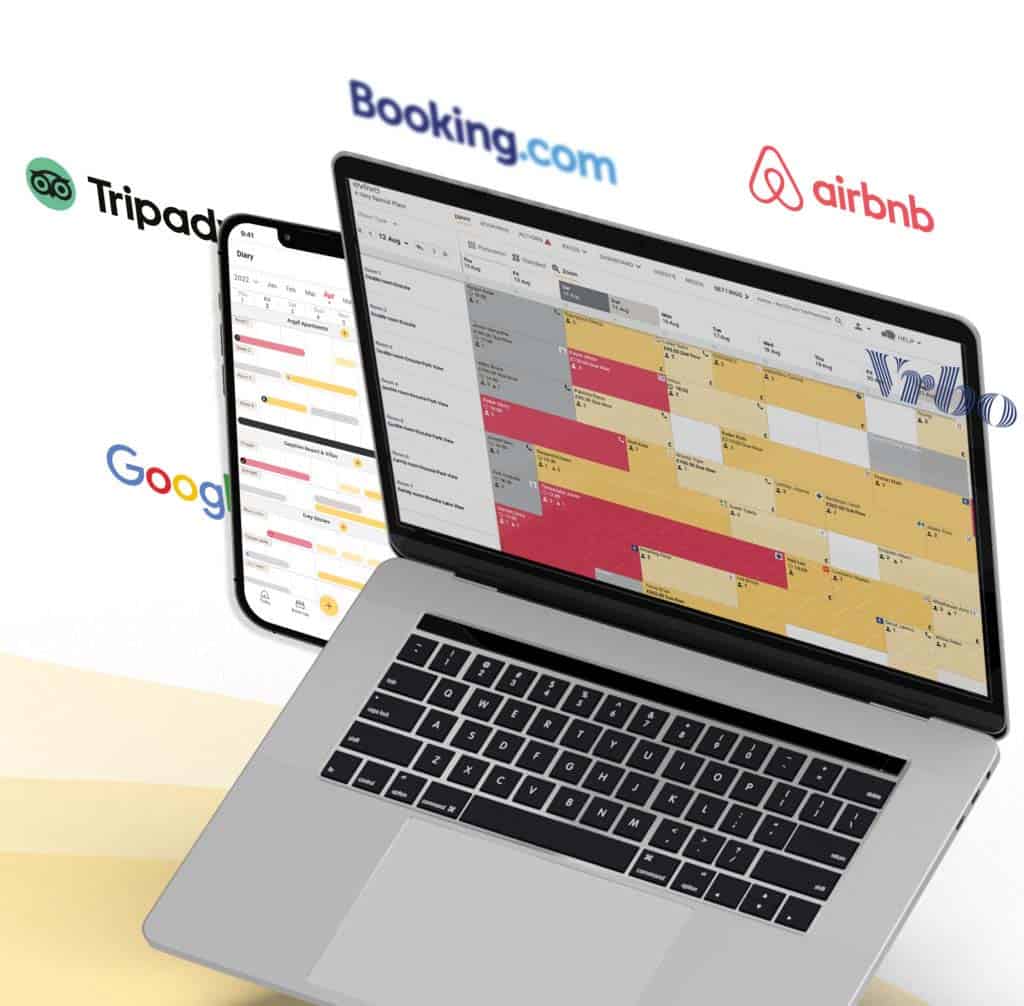Using a hotel channel manager makes it much easier to manage your network of connected online travel agencies (OTAs) and other distribution channels effectively.
But with so many options on the market, how do you know which channel manager is best for your business?
In this article, we help you find the right channel manager for your hotel by exploring the ins and outs of channel management software. We’ll cover the key benefits, must-have features and questions to ask providers before you make your decision.
What is a hotel channel manager?
A hotel channel manager is a software application that allows you to manage your hotel’s room inventory and rates across multiple online distribution channels. These channels may include:
- OTAs like Booking.com, Hotels.com and Expedia
- Leading global distribution systems (GDS) like Amadeus, Sabre and Travelport
- Metasearch engines like Google Hotel Ads
- Your hotel’s own website.
Using a channel manager centralizes how you manage your inventory. This means you’re able to access and update your availability and rates on all connected channels from a single dashboard.
A channel manager also allows you to sell your hotel rooms on all your connected channels at the same time. When somebody makes a booking on one channel, your availability is automatically updated on all channels. Likewise, any updates to your rates are instantly updated wherever you sell your rooms online.
The best channel managers automate more features than your rates and availability. They have the ability to keep your content, promos and policies up to date across channels too.
Read our beginner’s guide to channel managers.
Benefits of using a hotel channel manager
A channel manager solves a lot of the challenges that hoteliers face when listing rooms on multiple online channels. It offers a centralized system and automated updates that make managing channels easier and more efficient. The results are faster processes, fewer errors, and a world of difference to your online visibility!
Take a look at these five major ways that using a channel manager benefits your hotel.
1. Makes inventory management more efficient
A hotel channel manager simplifies the process of managing your room inventory. Forget manually updating room availability and rates across multiple channels. Instead, a channel manager allows you to make changes in real-time through a single interface.
2. Time and cost savings
By automating the channel distribution process, you save significant time and effort. Rather than logging in to each channel individually to update information, a channel manager enables you to make changes in a fraction of the time.
3. Reduces overbookings and other errors
Using a channel manager ensures that your availability is accurate and up-to-date across channels. This helps you prevent double bookings at your hotel. Moreover, you also minimize the risk of other costly errors, such as rate discrepancies. This saves money while also preventing any potential damage to your hotel’s reputation.
4. Increases visibility and brand recognition
Major OTAs attract millions of travelers worldwide. By connecting to these platforms through a channel manager, you’re able to reach a much wider audience. This expanded market reach can lead to a boost in exposure — and bookings!
5. Potential to increase direct bookings
It may sound strange to say that using a channel manager can help you reap more direct bookings, but bear with us!
A well-known phenomenon termed the billboard effect shows that people tend to go to an accommodation’s website after seeing them listed on several OTAs. This (hopefully!) results in you earning a direct booking — one that’s come via an OTA.
The top OTAs and metasearch engines in the global market
Channel managers developed in response to the ever-growing global OTA marketplace. So, let’s identify the key players to connect to in the OTA market before we look at hotel channel manager software in more detail.
Below is a list of seven of the leading OTAs and metasearch engines worldwide.
Booking.com:
Booking.com is one of the world’s leading OTAs, offering a vast inventory of hotels and other accommodations. With a user-friendly interface and extensive search filters, Booking.com attracts millions of travelers seeking a seamless booking experience.
Expedia:
Expedia is another well-known OTA. Its comprehensive range of travel services includes hotel bookings. Expedia’s platform allows travelers to compare prices, read reviews and book accommodations that suit their preferences and budget.
Hotels.com:
Hotels.com specializes in hotel bookings. It offers a loyalty program that rewards frequent travelers with free nights. With a wide selection of properties, competitive pricing and a user-friendly interface, Hotels.com is a popular choice for many travelers.
Priceline:
Priceline aims to provide customers with the best value for money when searching for hotels, including through last-minute deals and discounts. This OTA is likely to appeal to price-conscious travelers looking to spend a little less on their hotel stay.
Agoda:
While Agoda originated in Asia, it has gained worldwide popularity due to its extensive inventory of global accommodations. Agoda offers competitive pricing and provides many exclusive deals, making it a popular choice.
Google Hotel Ads:
We don’t need to tell you that Google is the world’s largest search engine. Google Hotel Ads is Google’s travel metasearch engine. It displays rates and availability from an array of booking providers and OTAs. By connecting to Google Hotel Ads, you showcase your hotel on Google.com and Google Maps, and market directly to several billion Google users.
Consider connecting with some of these major players via your channel manager to enhance your visibility and attract bookings from a wide range of travelers.
Want to learn more about which OTAs are right for your hotel? Take a look at our Online Travel Agency infographic.
What do I need from a hotel channel manager?
To help you choose the right channel manager for your hotel, you should first ask what you need from your software. Of course, your ‘must-haves’ will change depending on the specifics of your business. However, here’s a short list to get you started.
You likely need the following from your hotel channel management software:
Right level of connectivity
You want to make sure that your channel manager is able to connect to your most popular online sources of bookings. In addition, you should also consider the depth of the connectivity a channel manager is offering you. Does it just keep rates and availability up-to-date across channels? Or are you able to synchronize elements like your content and policies too?
User interface and ease of use
There’s no point in having a channel manager if nobody on your team knows how to use it! So look out for an intuitive, user-friendly interface that simplifies your daily operations and reduces training time. For example, some channel managers allow you to opt-in and opt-out of connecting to major OTAs in just one click.
Seamless integration with your other software
A channel manager makes managing multiple OTAs easier by centralising and synchronizing data. Now imagine your channel manager is part of a centralized, connected management system for your hotel operations. Suddenly, many other processes are made easier too!
Consider keeping your channel manager integrated with – or part of – your PMS (property management system) and online booking engine. Doing so helps keep more data connected, which drives more efficiency, greater accuracy and smoother processes.
How to use a channel manager effectively as a hotel
A good channel manager allows you to do more than expand your distribution channels. To use your hotel channel manager to its full capabilities, you should make sure that you:
Connect to the right OTAs
You want to connect to the optimal number of channels to maximize bookings and revenue. However, more doesn’t necessarily equal better. Research the booking channels most aligned with your hotel’s niche, plus those that have performed the best for your business in the past.
We recommend focusing on a few of the major players (like Booking.com, Expedia, Agoda and Google Hotel Ads) along with a couple of specialised channels in your niche or geographic area.
Get insights on channel performance
Your channel manager is a source of valuable data for your business. For example, it may provide insights on booking volume or revenue per channel that can inform strategic decision-making, especially when you use it in combination with Performance Manager and/or analytics software.
Armed with this information, you’re able to identify trends, evaluate the effectiveness of your distribution strategy, and make data-driven adjustments to optimize your revenue and marketing efforts.

Integrate your channel manager with your booking engine
An online booking engine allows you to accept bookings directly from your hotel’s website. By using a channel manager, you’re able to manage your booking engine the same way as your other online distribution channels. This allows you to bring the benefits of channel management software to your direct channel. Additionally, it keeps the process of handling all channels consistent, making your life that little bit easier.
Integrate your channel manager with your PMS (Property Management System)
Your PMS is at the heart of your hotel’s daily operations. You probably use a PMS every day to help you streamline booking management, guest communications, check-in & check-out processes, and more.
It makes sense to have your channel manager integrate seamlessly with your PMS. You want the two systems to establish a 2-way connection that keeps data synchonized. Once this connection is established, any information you update in your PMS is recognized by the channel manager and sent out to your connected distribution channels in real time. This keeps information on your reservations, automatically updated across all channels.
You may wish to go a step further and select a channel manager that comes as part of an all-in-one PMS and booking management platform. Let’s explore the reasons to do this in more detail.
Why choose a PMS with a built-in channel manager?
An all-in-one PMS integrates data on your bookings, guests and more within a single platform. This allows you to monitor, manage and automate many day-to-day tasks from one place.
By having a channel manager included as part of your PMS, you take the level of seamless integration even further. You’re able to manage rates, restrictions and availability for different room types in one platform. As a result, you ensure that information is accurate and up-to-date across all channels. For example, the changes you make in your PMS are automatically updated on your OTA listings via your channel manager. Likewise, any bookings made on OTAs will pop straight into your PMS booking diary.
Here’s a quick breakdown of the benefits of choosing a PMS with a built-in channel manager.
One seamless solution
Having a PMS that includes a channel manager means everything comes connected and centralized. The benefits include no siloes and no double handling. Staff don’t have to be trained up on multiple software systems, so there’s greater efficiency and less chance of manual error.
Total visibility and more control
When your PMS and channel manager are part of the same system, you’re able to view everything in one place. For example, your PMS booking calendar will display every online booking and show you which channel it came from.
This visibility also gives you more control over your bookings. Regardless of the booking’s source, you’re able to open any booking in the calendar to view and modify:
- Payment and charge details
- Guest comms
- Guest details
- A summary of the reservation

Streamlined guest experience
To deliver the best guest experience at your hotel, you must make every interaction guests have with you positive. And that includes when they book!
Guests are likely to enjoy a smoother booking process when your channel manager is seamlessly integrated with your PMS. This is because your availability information stays accurate wherever guests are searching and booking. Bookings made on one channel are instantly reflected across all others. Consequently, there’s less chance of guests experiencing frustrated booking journeys. It’s a great way to start the guest experience on the right track.
Enhanced features
Many features are enhanced when your channel manager is part of the right PMS:
- Dynamic pricing features: An effective dynamic pricing strategy helps you keep your revenue optimized. Does your PMS allow you to set up rules to automatically update your rates as your rooms fill up? If so, find out whether those rates can also be updated on your connected channels via your channel manager.
- Reporting and analytics: Your PMS should be able to gather data through your channel manager. This gives you valuable insights on how your different booking channels are performing.

- Promotion tools: Use your PMS Promo Manager together with your channel manager to run promotions on a channel-by-channel basis. You’ll be able to run promos that are exclusive to your website alongside ones you run on your distribution channels. The result is total flexibility!
- Guest communication features: You want to keep control of your relationship with guests even if they book via an OTA. See if you’re able to use the guest engagement features on your PMS to automate and customize OTA re-confirmation emails. By doing so, you make sure that guests receive the right information in your own words.
- Invoice and payment management capabilities: To keep control over your OTA bookings, use a PMS that allows you to: produce guest invoices showing the gross price rather than the net OTA price; reconcile OTA payments with the bookings you received; and report bad cards directly to the OTA through your PMS
Questions to ask channel manager providers
If you’re considering purchasing a specific channel management software, you want to first ensure that it’s totally suited to your needs. Here are some questions to ask the provider that should help you make the right decision.
If you’re considering purchasing a specific channel management software, you want to first ensure that it’s totally suited to your needs. Here are some questions to ask the provider that should help you make the right decision.
What is the scope and depth of your channel manager’s connectivity?
Inquire about the number and types of OTAs and other distribution channels that the channel manager integrates with. Ensure that it covers the channels most relevant to your target market and business needs.
Don’t forget to find out about the depth of connectivity, too. How many features does the channel manager synchronize with the market’s major channels, beyond rates and availability?
Can I manage rates and availability for different room types through your channel manager?
Find out whether the channel manager allows you to manage rates and availability for different room types. You should be able to set specific rates, restrictions, and inventory allocations for each type of room. This capability ensures that everything is represented accurately across all distribution channels.
Is it possible to implement different pricing strategies?
Many hotel channel managers allow you to put in place different pricing strategies across your connected channels. Find out whether you can adjust rates based on demand, seasonality or market conditions to optimize revenue and occupancy. For example, can you automatically adjust your rates at certain occupancy thresholds across all channels?
Can I track the performance of my different distribution channels?
A good hotel channel management solution provides comprehensive analytics and reporting capabilities. This enables you to track how each of your distribution channels are performing.
What’s the best channel manager for hotels?
We believe eviivo Suite offers hoteliers the best channel manager on the market for a range of reasons:
- eviivo Channel Manager is part of an all-in-one, cloud-based PMS, eviivo Suite. Thus, all your data is centralized and synchronized in one system, which simplifies tasks across many areas of your operations.
- We natively support the major OTAs and metasearch engines in the worldwide market. That list includes (but is not limited to) Booking.com, Expedia, Hotels.com, Priceline and Google Hotel Ads.
- eviivo’s extensive API integrations offer deep connectivity to your connected channels. Rates, availability, content, policies, photos and descriptions can be synchronized across OTAs. As a result, users save hours of manual work per week while banishing unwanted overbookings.
- eviivo Suite has been recognised in various aggregated lists and rankings of the best channel management software. Our Channel Manager has been ranked as a ‘Category Leader’ (GetApp), a ‘Top Performer’ (Capterra), and a ‘Front Runner’ (Software Advice).
Choosing a Hotel Channel Manager: A Buyer’s Guide
Key Takeaways
- Hotel channel managers centralize inventory and automate updates across multiple online channels.
- An effective channel manager allows you to make time and cost savings, reduce errors, increase your hotel’s visibility, and potentially increase your direct bookings.
- Connecting to the right OTAs is crucial for maximizing bookings and revenue. Focus on major players like Booking.com, Expedia, Agoda, and Google Hotel Ads, along with a few specialized channels.
- When choosing a channel manager, consider its connectivity, ease of use, and its level of integration with your other hotel software
- An all-in-one PMS with a built-in channel manager provides seamless integration, total visibility, more control, and a streamlined guest experience.
- Key features to look for in a PMS with a built-in channel manager include dynamic pricing, reporting and analytics, promotion tools, guest communication features, and invoice and payment management capabilities



